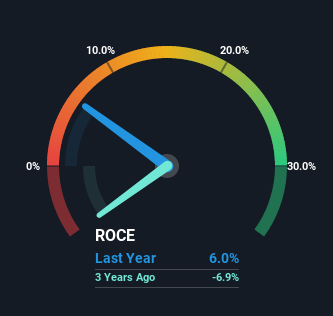- Canada
- /
- Specialty Stores
- /
- TSX:IDG
Capital Allocation Trends At Indigo Books & Music (TSE:IDG) Aren't Ideal
Did you know there are some financial metrics that can provide clues of a potential multi-bagger? Firstly, we'll want to see a proven return on capital employed (ROCE) that is increasing, and secondly, an expanding base of capital employed. Put simply, these types of businesses are compounding machines, meaning they are continually reinvesting their earnings at ever-higher rates of return. In light of that, when we looked at Indigo Books & Music (TSE:IDG) and its ROCE trend, we weren't exactly thrilled.
Return On Capital Employed (ROCE): What Is It?
If you haven't worked with ROCE before, it measures the 'return' (pre-tax profit) a company generates from capital employed in its business. The formula for this calculation on Indigo Books & Music is:
Return on Capital Employed = Earnings Before Interest and Tax (EBIT) ÷ (Total Assets - Current Liabilities)
0.06 = CA$27m ÷ (CA$767m - CA$326m) (Based on the trailing twelve months to July 2022).
Thus, Indigo Books & Music has an ROCE of 6.0%. In absolute terms, that's a low return and it also under-performs the Specialty Retail industry average of 18%.
Check out our latest analysis for Indigo Books & Music

In the above chart we have measured Indigo Books & Music's prior ROCE against its prior performance, but the future is arguably more important. If you'd like to see what analysts are forecasting going forward, you should check out our free report for Indigo Books & Music.
How Are Returns Trending?
In terms of Indigo Books & Music's historical ROCE movements, the trend isn't fantastic. Over the last five years, returns on capital have decreased to 6.0% from 7.9% five years ago. However, given capital employed and revenue have both increased it appears that the business is currently pursuing growth, at the consequence of short term returns. And if the increased capital generates additional returns, the business, and thus shareholders, will benefit in the long run.
On a side note, Indigo Books & Music's current liabilities are still rather high at 43% of total assets. This can bring about some risks because the company is basically operating with a rather large reliance on its suppliers or other sorts of short-term creditors. While it's not necessarily a bad thing, it can be beneficial if this ratio is lower.
The Key Takeaway
While returns have fallen for Indigo Books & Music in recent times, we're encouraged to see that sales are growing and that the business is reinvesting in its operations. But since the stock has dived 88% in the last five years, there could be other drivers that are influencing the business' outlook. Therefore, we'd suggest researching the stock further to uncover more about the business.
If you'd like to know about the risks facing Indigo Books & Music, we've discovered 1 warning sign that you should be aware of.
While Indigo Books & Music isn't earning the highest return, check out this free list of companies that are earning high returns on equity with solid balance sheets.
New: AI Stock Screener & Alerts
Our new AI Stock Screener scans the market every day to uncover opportunities.
• Dividend Powerhouses (3%+ Yield)
• Undervalued Small Caps with Insider Buying
• High growth Tech and AI Companies
Or build your own from over 50 metrics.
Have feedback on this article? Concerned about the content? Get in touch with us directly. Alternatively, email editorial-team (at) simplywallst.com.
This article by Simply Wall St is general in nature. We provide commentary based on historical data and analyst forecasts only using an unbiased methodology and our articles are not intended to be financial advice. It does not constitute a recommendation to buy or sell any stock, and does not take account of your objectives, or your financial situation. We aim to bring you long-term focused analysis driven by fundamental data. Note that our analysis may not factor in the latest price-sensitive company announcements or qualitative material. Simply Wall St has no position in any stocks mentioned.
About TSX:IDG
Indigo Books & Music
Operates as a book and lifestyle retailer in Canada and the United States.
Undervalued with mediocre balance sheet.
Market Insights
Weekly Picks


Crazy Undervalued 42 Baggers Silver Play (Active & Running Mine)


Fiducian: Compliance Clouds or Value Opportunity?

Willamette Valley Vineyards (WVVI): Not-So-Great Value
Recently Updated Narratives


Positioned globally, partnered locally


When will fraudsters be investigated in depth. Fraud was ongoing in France too.


Staggered by dilution; positions for growth
Popular Narratives


MicroVision will explode future revenue by 380.37% with a vision towards success


NVDA: Expanding AI Demand Will Drive Major Data Center Investments Through 2026





